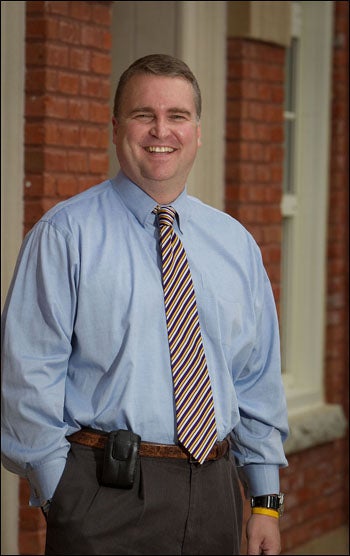WINNING WORK
'Getting involved…saves lives'

Peter Romary, ECU director of Student Legal Services, was honored by the North Carolina Coalition Against Domestic Violence for his work with domestic violence victims. (Photo by Cliff Hollis)
Peter Romary, director of Student Legal Services at East Carolina University, has represented, free of charge, more than 1,200 victims of domestic violence. His volunteer work has made him a leader, nationally and internationally, in advocating for victims and put him among 52 men honored worldwide in the Times Square Project for work to combat violence against women.
Now, that service has brought Romary another recognition: the 7th Annual Verizon Wireless Men for Change Award from the North Carolina Coalition Against Domestic Violence. The award was presented Nov. 17 at the Crabtree Marriott in Raleigh. The ceremony included a keynote presentation by David Elliott, director of Victims and Citizens Services in the N.C. Department of Justice, and a filmpremier of “A New Kind of Strength: Men Working to End Violence Against Women.”
The N.C. coalition is a statewide non-profit organization founded in 1981 to support domestic violence agencies and allied professionals, strengthen the network of people working to end domestic violence and advocate to improve statewide policies and legislation that impacts the lives of domestic violence victims.
Beth Froehling, its executive director of the coalition, said Romary served as a good example of how one person can change many people’s lives. “Legal representation is one of the most important services that can make a difference between a victim being able to leave a violent relationship or not,” Froehling said.
Romary shared his thoughts about domestic violence, his work for victims and his reasons for doing it in this Q&A with ECU News Services.
Q. What has been your role in domestic violence that led to this statewide award?
A. For 12 years in private practice, I represented 100 women and children victims of domestic and sexual abuse, as well as other crimes of violence per year on a pro-bono-basis. I have been involved in cases in a number of states and overseas. I have worked with legislatures and domestic violence advocacy groups to change laws and enhance the rights of victims of violence.
I have worked also in the threat management field and a particular area of interest for me has been targeted violence that involves domestic violence or stalking.
Additionally, I have spoken around the U.S. and overseas on domestic violence, stalking, threat management and other related topics.
I still volunteer time to consult on domestic violence and abuse cases from around NC and beyond—I still lecture around the US and beyond and closer to home I have designed two courses that I teach at ECU that include pieces on domestic violence/stalking/abuse and threat management.
Q. Why did you get involved in the issue of domestic violence?
A. I have never been able to abide a bully. In 1995, I was asked by a local domestic violence agency to assist a lady and her son. The son had physical and mental handicap and had witnessed horrific violence. I knew I had to do all I could to help and, when I realized the extent of the problem throughout society I knew I had to do more.
Q. What are the most important facts for the public to know about domestic violence and its victims?
A. Statistically, we know that 1 in every 4 women will be a victim of some type of abuse. Children who witness abuse or who themselves are abused suffer terrible consequences as a result and the impact on them and society at large is huge. It is very easy for people to turn away from the problem of to say that it is a private matter, but when we do that, we are turning our backs on our mothers, sisters, daughters and friends. Getting involved is the right thing to do and it saves lives.
Q. What advice would you give someone who would like to help a friend or family member who is in an abusive or dangerous situation?
A. Listen to them, help put them in touch with resources that can assist them, go with them and let them know you are there to help them. People are afraid that if they get involved it will be seen as interference by the victim, to them I say that often that is not the case and besides it is better to be thought of as someone who interferes than to see the friend murdered—too often these cases escalate. Help be part of the solution, work to help with safety planning and let people know you care.
Q. How can men in a community help prevent domestic violence?
A. Show you care. Let people know that you will not tolerate domestic violence or child abuse and you will not tolerate those who abuse. Volunteer some time to a community organization. Don’t tell, or laugh at jokes about domestic violence. Be a role model for young men as well, this behavior is learned, people don’t just become abusers when they become adults they see the behavior think it is OK, it’s not and we need to spread that message far and wide.